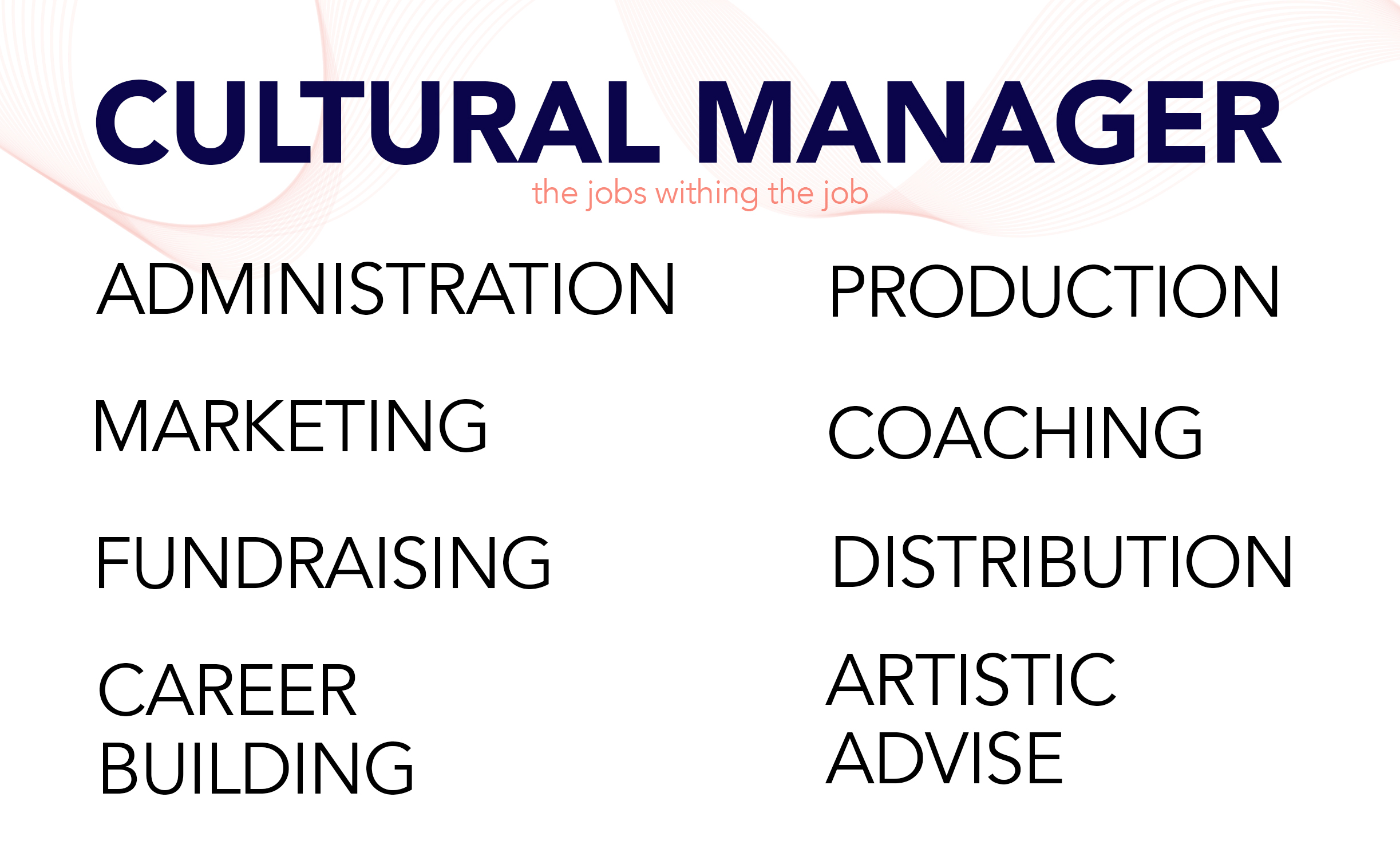
The benefits of working with a cultural manager
In this following lecture, we want to invite you to think about the benefits of working with a cultural manager or agency. We have invited TINA Agency, an international cultural management agency that specializes in working with artists, performers, and other cultural professionals. They will be sharing their expertise and experience of the benefits of working with a cultural manager and how it can help you take your career to the next level.
There is a general understanding or assumption that artists, after finishing their school years, should start building their careers by themselves, step by step. For example, a dancer would ask a couple of friends to help release an idea, the group would go to an underpaid residency, and they will try to apply for some funding, unsuccessfully at first but, at least, the finished piece will be shown in some contexts. The dancer is slowly figuring out how to improve the way it is filling out the subsidy application, how to fill out an Excel sheet, and how to keep records of all the invoices. Usually, the dancer will ask experienced artist friends in this process. Thanks to that, after a couple of trials and errors, the application results will become positive.
Artists suddenly find themselves managers of their own company, having to deal more with funding applications and accountancy, than with their artistic work. It is not until later in their career that they will understand the job of a manager and the possibility to be accompanied by one. Working with a cultural manager can provide you with benefits that can help you achieve your goals. For example, they can help you with all the business-related activities such as: booking gigs, negotiating contracts, and managing your finances. They can also help you with the creative side of your career: such as developing your brand, creating new work, advising you on what to do next, and building your online presence.
In this lecture, TINA Agency will provide you with a detailed overview of how cultural management works, including the services they offer, the process of working with a manager, and how to find the right manager for you. They will also share real-life examples of how working with a cultural manager has helped their clients succeed on the international market.

Cultural managers, such as Valeria and Laia, are still not on the radar of emerging artists but if there is a school of dance, theatre, circus or art there is a school or a program about cultural management full of emerging cultural managers looking for projects. If after watching the lecture and learning about the benefits of working with a cultural manager, you decide that this is the right path for you, the next step is to start researching schools that offer programs in cultural management. Send an email to the school with a project proposal, explaining what you do and what you need, and ask them to put you in contact with alumni of the school who have built careers in the arts. Ask for recommendations and see if they would be willing to meet with you, hear about your needs and share their experience and insights. You can also ask them what kind of support and guidance they offer. This will give you an idea of what kind of services are provided by a cultural manager and what you should expect from working with one.

Cultural managers have many different tasks and responsibilities, which can make it difficult to describe their job in just a few words. Tina Agency has given you the three main areas on which a cultural manager focuses, though this is not a definitive list. Some managers will also help you with production, others with marketing (e.g. social media management, communication and design). As artists, every manager or producer is unique as well and each of them will have different skills to apply to the job. After getting to know more about yourself and the needs of your work, you will figure out what to ask for. Also, the clearer you are about your work and your needs, managers will understand what they can offer you and if they are interested.
The thing about money…
At the beginning of your career, you probably won’t have the resources to finance a cultural manager and the prospect of growth will be very uncertain. Because of this a professional manager will have more difficulties trusting in your project. That is why we recommend building a relationship with managers that are at a similar place in their career path. You both might not have a lot to offer, but it would be a relation of mutual development and trust, rather than a service-based association.
Once you start to be more established and get more financial support and more work opportunities, the manager will also have to be paid. The fee of a manager will of course depend on the workload of your projects or company.
Most cultural managers work with a portfolio of artists, meaning they represent and manage multiple artists at the same time. This approach has several benefits for both the manager and the artists. For the manager, working with a portfolio of artists helps to distribute the workload and the financial risk. Instead of relying on the success of one artist to sustain the agency, the manager is able to spread the risk across multiple artists, which can help to ensure the long-term stability of the agency.
For the artists, working with a manager who represents multiple artists can also have benefits. For example, the manager is likely to have a bigger contact list and network which can be shared among the artists they represent. This can help to open new doors and opportunities for the artists and increase their chances of success in the international market.
Another positive aspect of working with several artists at the same time is that resources can be shared among them. This can include things like office space, equipment and administrative support. In summary, working with a cultural manager who represents a portfolio of artists can have many benefits for both the manager and the artists. It allows the manager to distribute the workload and financial risk and it can also help the artists to take advantage of the manager’s wider network of contacts and resources.
- How to continue
Lesson number six deals with practical tools, software and apps that can help you organize your work. While you still work alone, some of those tools can ease some of the daily monotonous tasks you have.
Lecturer
TINA Agency (Laia Montoya & Valeria Cosi)(Catalonia-Italy-Germany)
Is a collaborative project that works for the innovation and accompaniment of performing arts management and artistic creation with the goal of providing changes to the traditional paradigm of cultural management. In their own words:
“We create specific ecosystems for each project we are involved in, always from a sustainable point of view for the whole of the contemporary performing arts sector. The agency works based on the value of adaptability to each project and its needs. That means the capacity of fluidity being aware of the possibilities and choosing the ones that match better with our collaborators. With a professional approach, and a restless and adaptable attitude, we get involved with passion in everything we do, looking for the potential of the projects we work with, identifying its nature, and creating specific ecosystems for each of them. Welcome to TINA Agency”.









